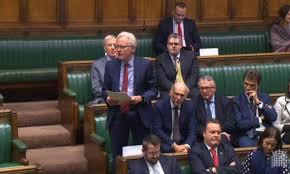British lawmakers narrowly rejected a vote to legalise recreational cannabis on Tuesday, despite backing from a former UK health minister.
Liberal Democrat MP Norman Lamb said he would continue fighting to overturn the ban following the rejection of his 10-minute-rule bill in the House of Commons by 66 votes to 52 on Tuesday.
Lamb, the Lib Dem health spokesman between 2015 and 2017, put forward a motion to legalise the possession, distribution, sale and consumption of cannabis in the UK, after hearing of the plight of three constituents.
The trio suffer “acute and continuing pain” from fibromyalgia, osteoporosis, Parkinson’s disease and a leg injury, Lamb said, and are unable to use legal painkillers such as Fentanyl and codeine.
One man, who was cautioned by the police after purchasing cannabis online, now fears he will be unable to visit his son in Australia, Lamb told MP’s.
“Cannabis offers him essential pain relief but he has no option but to buy it illegally,” Lamb said. “He knows, at any time, he could face arrest and prosecution.”
He told MPs: “It is clear the recent reforms are not working,” and called for a “more enlightened approach”.
Earlier this year, the UK tweaked legislation to allow doctors to prescribe medicinal cannabis following a huge push by advocates highlighting the plight of sick children who could be treated by the plant, but MPs have been reluctant to press for total decriminalisation.
Medicinal cannabis is becoming more accessible across Europe, but full legalisation remains out of touch. Mexico and Luxembourg plan to legalise recreational cannabis use, following the lead of Canada and 30 US states, and New Zealand is considering a referendum.
Prohibition has failed everywhere, Lamb said, adding his bill offered a “more rational alternative to this mess”. He proposed “strict regulation” on the growing, selling and marketing of the drug, which he said should be legalised for adults.
Conservative MP Steve Double said he felt “something needs to be done” but the legalisation proposal from Lamb was not the answer.
“I have seen very close up and first-hand, the lives that it wrecks, the impact on mental health that it has, and the cost that it not only has to the individuals but to their families, to their communities and to wider society,” said Double.
Following the defeat, Lamb issued a damning statement criticising fellow MPs for their approach.
“It is total hypocrisy that the most dangerous drug of all, in terms of harm to yourself and others, alcohol, is consumed in large quantities right here in our national Parliament, whilst we criminalise others for using a less dangerous drug – with many using it for the relief of pain,” said Lamb.
Medicinal use of cannabis oil has been widespread in 2018, and made headlines in the UK through several high-profile campaigns.
The law on the use of medicinal cannabis changed in November, but the new rules did not recommend the use of cannabis oil and advocates say there has been little education of the UK’s medical profession which is still reticent to prescribe marijuana.
Several pro-cannabis lobby groups and consultancies have sprung up in the UK, and on Monday the Centre for Medical Cannabis became the latest.
The group consists of “philanthropists, scientists, campaigners, public policy experts and educators” hoping to advance responsible, ethical and evidence based access to medicinal cannabis.
The founding team includes Steve Moore, who successfully directed the campaign on behalf of Charlotte and Billy Caldwell this summer.
Ms Caldwell has been fighting for 10 years to allow epilepsy sufferers to be treated with cannabis.
Her son’s seizures returned in 2016, causing her to travel to the US where medicinal cannabis was prescribed by his specialist, a move which eventually triggered the rule change in the UK.
Last week, drug experts at the World Health Organization controversially delayed a decision on the rescheduling of cannabis, following a landmark two-year review.
In presenting findings to the United Nations, it was widely expected that a recommendation be passed to remove cannabis from the category of dangerous narcotics at international level.
A spokeswoman for the WHO told Cannabis Law Report: “The clearance process at WHO is ongoing. This is a complex issue that requires careful consideration and the WHO Director-General has requested more time to process the advice he received from the ECDD.”
A decision is not expected before January.


















